- Home
- Lou Cameron
Renegade 36 Page 12
Renegade 36 Read online
Page 12
As he joined Captain Gringo and the others discussing the matter with the engine crew, he was barely able to follow the conversation. He could say just about anything in Castilian, slowly, and he could understand anyone speaking Spanish to him at a reasonable speed, but Cuban Spanish sounded garbled as well as too fast. Even his Spanish friends thought Cubans chattered like the monkeys on their family tree. The tall officer, obviously pure Castilian from his blond hair, seemed comfortable with the ungodly peasant dialect. As Churchill moved to join Captain Gringo, he idly wondered where the officers assigned to the troop train might be. Then he felt something hard and cold against his left kidney, and a voice behind him whispered, “Step over to the side, out of the light, and you just may live, you cocksucker.”
The young reporter did what many an older man might have done with a gun to his back. But as Gaston herded him into the shadows he said, “I’ll have you know I’m a British subject, damn it!”
Gaston switched to his own kind of English as he replied, “In that case, you may not be a sucker of cocks. Mais you will still be dead, if you do not behave yourself.”
Churchill could now see the other Spanish officers in the trackside gloom, huddled together and guarded by what seemed to be other Spanish soldiers. He asked Gaston, “What’s going on here? Why on earth would even General Weyler have Spanish officers arrested? These are all good loyal chaps, I assure you. I was just up at the fighting front with them.”
Gaston told him to shut up. Then he had a better idea and asked, “You say you know the battle area, my little Englishman? What are you, a soldier of fortune who works très cheap?”
“I’ll have you know I’m a neutral war correspondent, sir. As such I am not allowed to serve in any military capacity.’’
“Merde alors, that is not as important as the fact you know more about the country to the east than we do. Stick your adorable self with me, my juicer of limes. We shall have a word with Captain Gringo about you after we get this très confusé situation out of the dope.’’
Young Churchill gasped and said, “I say, I’ve heard of the renegade they call Captain Gringo! He’s become quite notorious in recent months. You say he’s with you, in the Spanish Army of all places?’’
“Let us stroll toward camp. Do not tell my friend Dick how well-known he is these days. That is one of the things he worries about, and right now he has enough on his mind, hein? By the way, we are not the Spanish Army. We are the wee people.’’
“Good Lord, I see it now! This is a rebel ruse designed to capture the train! I must say it all seems rather clever, but I don’t see much military advantage to your lot. There’s only a handful of unwounded like myself aboard. The poor lads in those cars have all been badly shot up by your comrades in the Sierra Maestra. You surely don’t mean to, ah, hurt them, do you?’’
Gaston shrugged again and said, “I do not know what Dick plans to do with them. Nor do I care. In my old army we shot the wounded on our side. Mais regard, the engine marches. Let us stroll to see what should be done about you, hein?’’
They joined Captain Gringo and some of the others as the engine moved the troop train slowly through the wire. Churchill said, “Wait, that’s my perishing train you’re allowing to go on without me!’’
Gaston told him it wasn’t going far and, as they joined Captain Gringo, added, “Look what I found, Dick. A species of Englishman who says he knows the country ahead.’’
Captain Gringo stared soberly down at the shorter as well as younger man in the flickering light from the passing cars. The captive said, “I’m Winston Churchill, foreign correspondent.”
So Captain Gringo said, “Never heard of you. You want to go on living?”
“I would, if you don’t mind.”
“Swell. I’m taking a train to Garcia. I don’t know where Garcia is. I’m sure open to suggestions, kid.”
Churchill shrugged and replied, “I know where the rebels were as of this morning. Lord only knows where they may be now. They do move about, you see. We had a rousing battle with them for breakfast. Drove them off, of course. They never stand their ground, once the regulars recover from their first surprise and get ready to counterattack.” He remembered where he was and who he was talking to, and added, “I mean the people I was with had a battle with them for breakfast. I was only there to take notes. I’m not sure I’m allowed, under international law, to do anything for you chaps that might constitute aid and comfort and all that rot.”
“Nobody’s asking you to fire a gun. You don’t get a gun, even if you ask for one,” growled Captain Gringo. Then he told Gaston, “Keep him here until we back the engine this far. He’ll be riding with us in the tender.”
Gaston nodded and said, “Oui, what about those officers back along the track, Dick?”
Captain Gringo said, “We’ll pick up their guards as we back past ’em. Once we’re on our way, they’re on their own.”
“You know, of course, they will surely wire Havana as soon as they can?”
“So what else is new? They won’t be able to wire ahead to Oriente Province, and I wasn’t planning on going to Havana tonight in the first damned place. Wait here. I gotta get over to the yards and play switchman.”
As he vanished into the darkness, Churchill told Gaston, “I say, he doesn’t have as many horns as I was led to believe. Are you really going to spare your prisoners?”
Gaston said, “He just told us to, did he not? Do not get any ideas we are sissies, my cheerful youth. I have a forked tail under my pants. You Anglo-Saxons are all idiots when it comes to helpless prisoners. Any Latin can tell you it is much more easy to kill an enemy when he is in no position to fight back. Mais my American friend is addicted to a weakness of character he calls sportsmanship.”
The English reporter made a mental note that the Spanish had executed the handful of rebels they’d captured that morning, in the interests, they’d assured him, of simple eye-for-an-eye justice. It was probably true Garcia tortured captured Spaniards to death. But at least this lot seemed to be behaving decently so far.
After a lot of mysterious clankings and bangings in the darkness, the erstwhile troop-train engine backed into view, It was a Baldwin 464. Along with its heavy tender, it had been built for power on much more rugged rails than they had down here. It was now pulling the headquarters passenger car, the flats loaded with guns for Garcia, and the big crane. It didn’t stop. It was moving slowly. So Gaston shoved Churchill aboard and clambered up into the cab after him. They found themselves with Pancho and an engineer and fireman who’d said they’d never wanted to work for Spain in the first place. Gaston asked where Captain Gringo was. Pancho said, “Up forward or, in this case, to the rear. He told me to keep an eye on these new recruits while he did something with the crane.”
Gaston told Churchill to climb up atop the coal in the tender. When the Englishman did so, he found himself sharing the ride with a pair of Maxim machine guns aimed the way they were backing. He lit another cigar and settled down to see what happened next. There was nothing much he could do now. His best chance for a break would be once they were back in the battle zone, where a running chap could hope to run into friends.
As they passed the clump of Spanish prisoners, Gaston called down to let them go and pile aboard. The guards looked disappointed but did as they were told. The last Churchill saw of his former comrades from the troop train, they were running for the lights of the camp. Gaston chuckled and called up to him, “Stay where you are for now. Pancho here will not bite unless you tease him. I must see what is going on in more interesting places, hein?’’
Getting there was half the fun, Gaston decided, as he gingerly swung out of the cab, walked the catwalk running along the boiler to the cowcatcher, and leaped over to the passenger car. On his way through it, he checked to make sure they’d dumped all the dead over the side. He jumped from the rear platform of the passenger car to the first of the flats. He had to climb over the crates of guns and amm
o. But it was easy enough, thanks to their rope bindings. He jumped on boiler-plate ballast forming a sort of monstrous sandwich at one end of the crane flat. He found Captain Gringo in the crane cab. He asked why, pointing out, “This impressive machine will not march with no fire under her boiler, and in any case, I see nothing around here calling for the use of a crane designed to lift derailed trains back on the tracks, hein?’’
Captain Gringo said, “I can move the boom right and left with these hand cranks, slow. Get inside with me. We figure to have some flying splinters around here any minute.’’
Gaston joined him in the little control cab, forced to stand as the bigger American occupied the only seat and most of the space. He was turning a big steel wheel with both hands, and as far as Gaston could see in the dim light, nothing much was happening. Then he heard a god-awful crunch, a loud multiple twang, and all sorts of crap started clanging against the sheet-iron roof overhead.
Captain Gringo chuckled and said, “I knew she’d swing as far over as the telegraph poles.’’ Anything he might have added was drowned out by more twangs and thuds until Captain Gringo slowly moved the boom inboard again after tearing out a quarter mile or so of telegraph line, mostly by the roots.
Gaston was still congratulating them when the Englishman, Churchill, climbed in with them to ask what on earth was going on. Captain Gringo asked how the hell he’d gotten past all the others, and Churchill explained Pancho had sent him to find out what all the noise was about. Captain Gringo growled, “That’s what I like. A guy who pays attention to orders. Okay, so we trust you, a little. Don’t get any ideas. Go back and tell the engine crew to stop. I want to try something else.’’
As the young Englishman left, Gaston swore and said, “I told Pancho to watch him, not to use him as a messenger boy!”
Captain Gringo said, “He’s probably harmless, and Pancho has to keep an even closer eye on the Cuban engine crew. No matter how loud they yell Cuba Libre, they still know more ways to fuck us up than that kid reporter. We’ll have to rig up a better signal system between here and the cab. It takes too long the hard way.”
It took the reporter the better part of four minutes, in fact, if one judged by the time it took to grind to a halt in the darkness.
Churchill returned as Captain Gringo was on the tracks to the rear, holding the crane’s big hook uncertainly. The Englishman said, “Oh, are you planning to devise a rail wolf?”
“A rail what, Mr. Churchill?”
“A rail wolf. The Prussians used them in France in ’seventy. Before my time, of course, but I am a military history buff.”
“As a matter of fact, I was trying to figure out a way to maybe lift a length of track behind us from time to time. I have to figure out where this hook can get a good hold.”
Churchill said, “That’s not the way the Prussians did it. You need something like a plow to begin with. Then you load it down with lots of ballast, so it tends to dig in, and once you have it under the first cross-tie …”
“Ouch, no wonder they call it a rail wolf. I can see how it works. I doubt we have a moldboard plow on board, though. Hold the thought. We do have plenty of tools and muscle power. There’s all sorts of angle iron and such a car might spare if we don’t cut it all out of the same place.”
“What about those telephone poles beside the track, and of course, if one simply cut a length of track the hard way and bent it a bit over a jolly bonfire—”
Captain Gringo shushed him and said, “Go tell the engine crew we’ll be here awhile. Tell Pancho I want a work crew back here on the double.”
It took too long, according to Gaston, and looked nothing at all like the Prussian rail wolf he’d had in mind, according to Churchill. But it was still dark, just, when they finished installing the knocked-together monstrosity on the back of the crane car. It looked more like a big fishhook than a plow, weighted by a ton of lashed-together rail lengths cut as well by Pancho’s sweating track workers. The whole mess could be raised and lowered by the pulley of the overhead crane boom. While they’d been cobbling the rail wolf at trackside with the help of a roaring fire of creosoted ties, Gaston had devised a crude telegraph system from once-overhead wire the Spanish weren’t going to have any use for for a while. With the help of storage batteries from the passenger car, one could send simple clicks. That was all they were likely to need in any case, since hardly anyone in the outfit knew international Morse in the first place.
When they were ready to go, Churchill begged to be allowed to watch from the crane cab. Captain Gringo said okay, and Gaston said, “At least there will be plenty of light to work by soon. Have you forgotten that east-bound morning train, Dick? The one with all the fresh troops and ammunition on it?”
Captain Gringo said, “Quit your bitching. We’re at least three miles from the camp it’s supposed to reach no earlier than six. Signal the engine crew to get going, and let’s see how this new invention works.”
Gaston gave Pancho three clicks. The train started with a jerk. Captain Gringo began to pay out line. But Churchill said, “No. You have to get some speed up first. The engine’s wheels will just spin if you try to start up with the hook imbedded in the roadbed.”
“The Prussians told you that, huh?”
“I read it in a book. Besides, it’s simple physics, as soon as one thinks about it, Dick.”
“Okay, Winston. You know so much, you tell me when.”
Churchill grimaced and said, “My mother calls me Winston, old chum. My friends call me Winnie, if it’s all the same to you. I’d say we have a good bit of inertia going for us now.”
Captain Gringo lowered the rail wolf just as the sun was coming up. The big hook bounced high off a tie, came down between a couple, and dug in. The steel deck trembled under them as the rail wolf began its amazingly destructive work, snapping cross-ties like twigs. It didn’t do a hell of a lot for the rails to either side either. As he watched the steel twist and buckle to either side, Captain Gringo laughed and asked, “Hey, Winnie, how come it’s doing that? The hook’s not digging anywhere near the rails.”
Churchill explained, “Yes it is, in a way. To move through the earth under the ties and ballast it has to displace its own mass at what, ten miles an hour? The ends of the severed ties have to move up. They’re still attached, like levers, to the rails and, I say, look at that length curl, Dick. Must have been a rail joint, eh?”
Captain Gringo told Gaston to ask for more speed. Gaston did. It was even harder on the line behind them as they tore it apart at twenty miles an hour. Churchill warned that the Prussians had found things start to go wrong around thirty, since steel could only stand so much, even chopping wood and plowing dirt. So Captain Gringo contented himself with just tearing out five or six miles of single-line track before he raised the hook and asked for more speed. He said, “It should take them a month to put that much track back together. I’d better move forward to deal with anything we can’t get at with our rail wolf. You stay here, Gaston. I don’t know what the hell can run after us this fast the hard way, but I want a lookout back here anyway.”
Gaston unslung his carbine, braced it out the cab window, and said, “Eh bien, you recall our signals?”
“Yeah, three, five, seven mean ahead. Even numbers back up. One click means full stop, everyone off and take cover. What will you click if you see something coming up behind us?”
“Full speed, of course. I do not wish anything that can run that fast off the rails to get anywhere near me!” Captain Gringo laughed, but said, “We’re going to have to swipe a telephone system somewhere. Ought to be a station here and there ahead. I don’t see how they can be expecting us either.”
He climbed out of the cab and started moving forward. As Churchill followed, he started to wave him back. But the kid couldn’t get in any more trouble with him than he could with Gaston. So he didn’t say anything until they were up forward, atop the tender. Then he said, “I want you to stay back and don’t crowd me if I
need to fire these guns, Winnie.”
Churchill eased back on the coal but asked what he thought they might run into next. Captain Gringo told him he had no idea and asked, “How far would you say the next stop is?”
The Englishman stared uncertainly about for landmarks before he finally decided, “We did pass some sort of military installation just before you chaps stopped us. It should be coming up any minute now. Can’t say what it is. We didn’t even slow down as we passed. I’ve had the impression for some time that the Dons don’t want even a friendly newspaperman to see everything. From the size and watchtowers, I think it must have been a good-sized whatever. Probably a forward replacement center, eh?”
“We’ll know in a minute,” said Captain Gringo as, far down the track, he spotted tall spider-legged watchtowers on the horizon. He called for the engineer to slow down. The engineer, who did know the line as well or better than anyone else on board, called back, “Pero no, Captain Gringo. We must pass that reconcentrado as quickly as possible. It is run by military police. Bad ones, and they have machine guns up in those towers!”
“No shit? What about the guardhouse? Any heavy weapons?”
“I do not know. I have stopped there in the past with carloads of prisoners. I have never been inside. I never wish to be inside. That is why I suggest we move past it quickly. Those police arrest one for little or no reason at all!”
Captain Gringo told Pancho, “Move back and alert the others. When they hear me open up, they’re to pile out and start shooting at anything in uniform. Tell ’em to watch out for ragged pants and skirts, though.”
Pancho started to object, gulped, and got moving as the rooftops of the concentration camp came over the tawny horizon as well. Captain Gringo told the engineer, “Slow down. Give the others time to get set up.”

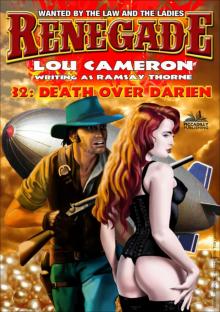 Renegade 32
Renegade 32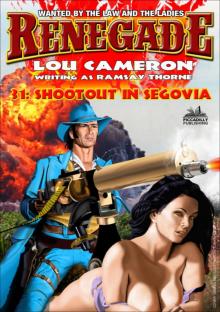 Renegade 31
Renegade 31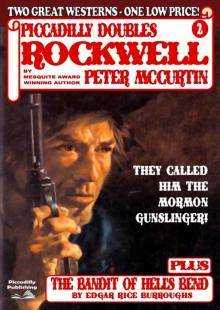 Piccadilly Doubles 2
Piccadilly Doubles 2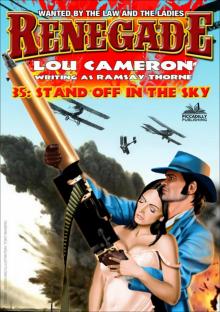 Renegade 35
Renegade 35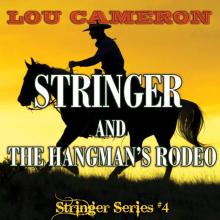 Stringer and the Hangman's Rodeo
Stringer and the Hangman's Rodeo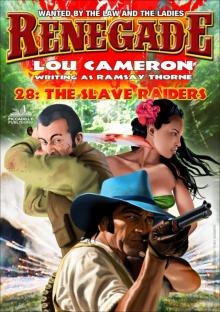 Renegade 28
Renegade 28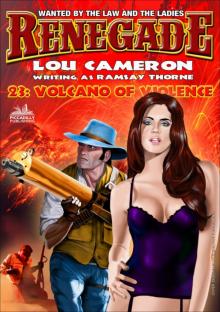 Renegade 23
Renegade 23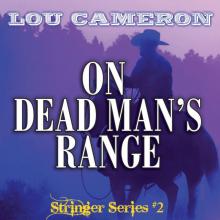 On Dead Man's Range
On Dead Man's Range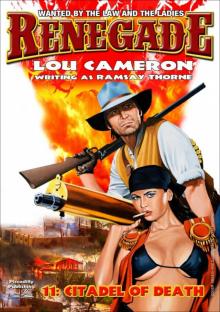 Citadel of Death (A Captain Gringo Western Book 11)
Citadel of Death (A Captain Gringo Western Book 11)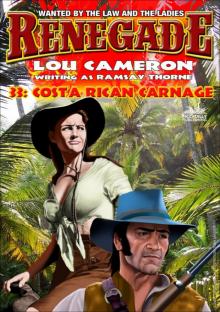 Renegade 33
Renegade 33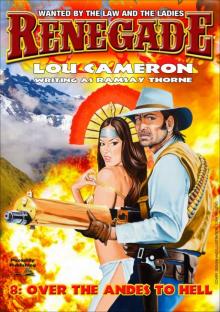 Over the Andes to Hell (A Captain Gringo Western Book 8)
Over the Andes to Hell (A Captain Gringo Western Book 8)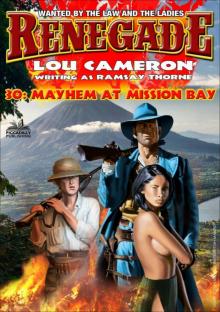 Renegade 30
Renegade 30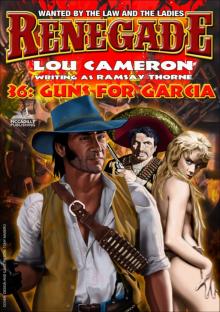 Renegade 36
Renegade 36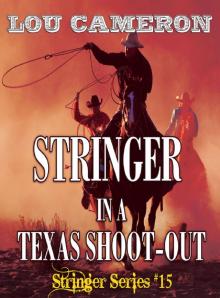 Stringer in a Texas Shoot-Out
Stringer in a Texas Shoot-Out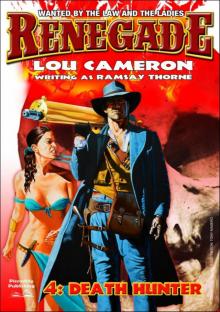 The Death Hunter
The Death Hunter Stringer and the Wild Bunch
Stringer and the Wild Bunch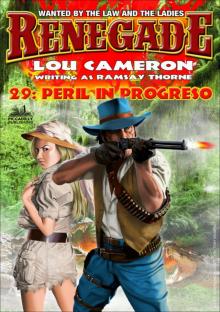 Renegade 29
Renegade 29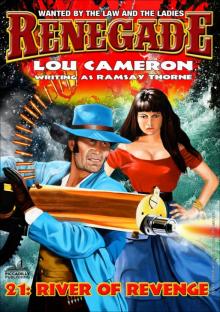 Renegade 21
Renegade 21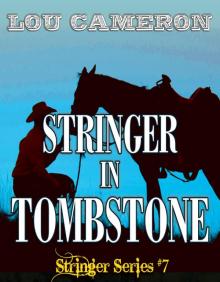 Stringer in Tombstone
Stringer in Tombstone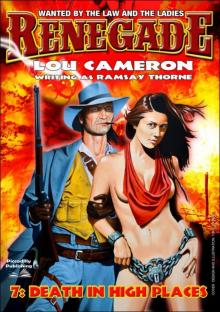 Death in High Places (A Renegade Western Book 7)
Death in High Places (A Renegade Western Book 7)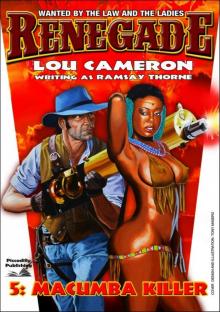 Macumba Killer
Macumba Killer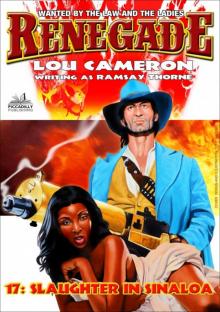 Renegade 17
Renegade 17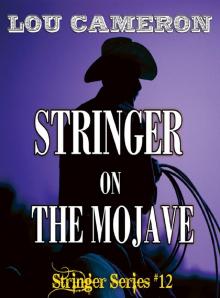 Stringer on the Mojave
Stringer on the Mojave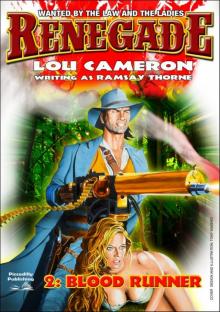 Blood Runner
Blood Runner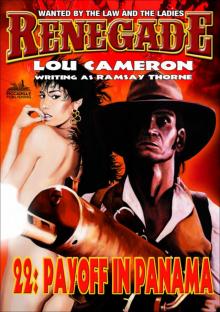 Renegade 22
Renegade 22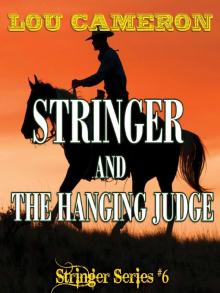 Stringer and the Hanging Judge
Stringer and the Hanging Judge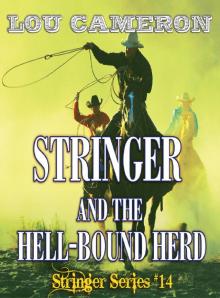 Stringer and the Hell-Bound Herd
Stringer and the Hell-Bound Herd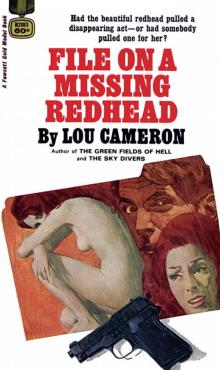 File on a Missing Redhead
File on a Missing Redhead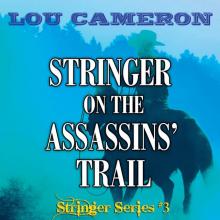 Stringer on the Assassins' Trail
Stringer on the Assassins' Trail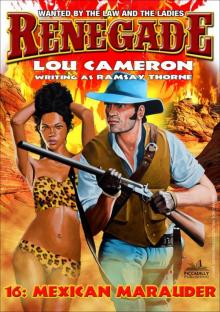 Mexican Marauder (A Captain Gringo Adventure #16)
Mexican Marauder (A Captain Gringo Adventure #16)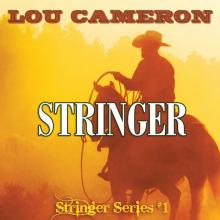 Stringer
Stringer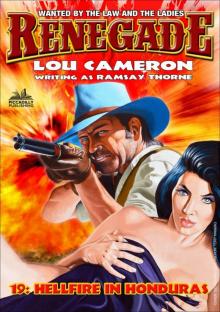 Renegade 19
Renegade 19 Stringer and the Oil Well Indians
Stringer and the Oil Well Indians Stringer and the Lost Tribe
Stringer and the Lost Tribe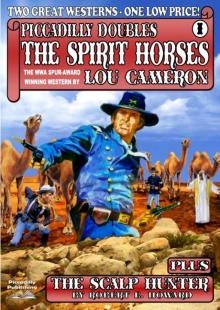 Piccadilly Doubles 1
Piccadilly Doubles 1 Stringer and the Border War
Stringer and the Border War Renegade
Renegade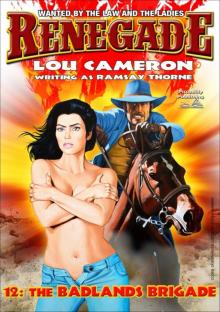 The Badlands Brigade (A Captain Gringo Adventure Book 12)
The Badlands Brigade (A Captain Gringo Adventure Book 12) Stringer and the Deadly Flood
Stringer and the Deadly Flood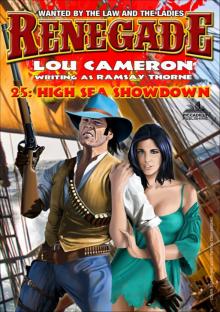 Renegade 25
Renegade 25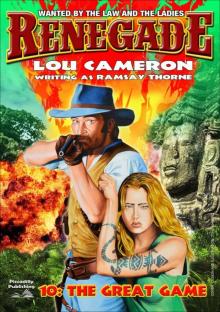 The Great Game (A Captain Gringo Western Book 10)
The Great Game (A Captain Gringo Western Book 10)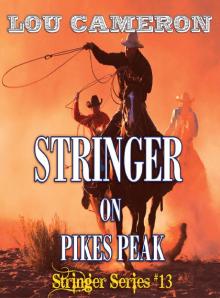 Stringer on Pikes Peak
Stringer on Pikes Peak